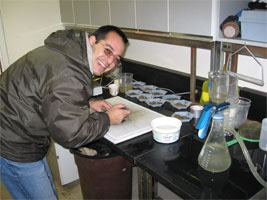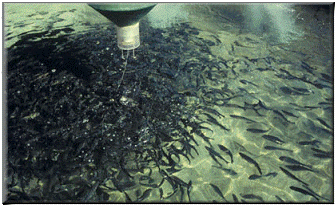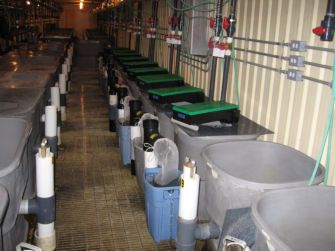AQUACULTURE STUDENT

FERNANDO SALAZAR-HERMOSO
What They Did Back Then
* Master of Science in Aquaculture completed 2007, University of GuelphAdvisor: Professor Richard D. Moccia
Evaluation of stable isotopes for the identification of aquaculture waste in the aquatic environment
ABSTRACT
Stable isotope signatures are used as tracers of foreign materials in ecosystems. Their applicability in aquaculture was evaluated in this study. The signatures of eight feed ingredients showed δ13C values between -12.92 to -25.85‰ and δ15N between 0.47 to 12.43‰. Three diets with different proportions of the above ingredients had δ13C values between -19.55 and -20.78‰ and δ15N values between 5.27 and 9.34‰. The signatures were identified in the feces and muscle of rainbow trout fed each diet, demonstrating the potential for isotope ratios to be used as tracers. Sediment from a commercial fish farm was sampled to determine if it had an isotope signature related to the feeds used (δ13C -20.12‰; δ15N 6.51‰). Results revealed isotope signatures more related to the control sites of δ13C -25.24‰ and δ15N 3.93‰ indicating that for this particular site, the feed isotopic signatures couldn’t be used as tracers of aquaculture-derived organic matter.
Links to papers or reports generated from this project.
-
Thesis (PDF version)
Where They Are Now
After graduating from Guelph, Fernando got a temporary position at the St. Andrews, Biological Station (DFO) in New Brunswick. Here he worked with the Integrated Multi-trophic Aquaculture (IMTA) group preparing a research document on “Potential biofilters for an IMTA system”. The result of that research was a comprehensive review of 103 species that could be used as biofilters, the document will be submitted for publication in a DFO's publication later on.
Currently Fernando is employed as a Research and Development Coordinator for the Aquaculture Association of Nova Scotia, residing in Halifax. His job involves identifying research needs in aquaculture and working to make them happen. Fernando works in collaboration with provincial and federal government as well as funding agencies to get research proposals accepted for the benefit of their members. This job is a great opportunity to know and experience all the aspects of aquaculture (science, industry and policy) and be involved and promote the development of the aquaculture industry.
Rainbow trout fingerlings activating demand feeder.

Alma Aquaculture Research Station: 700L tanks used for trout feces collection
